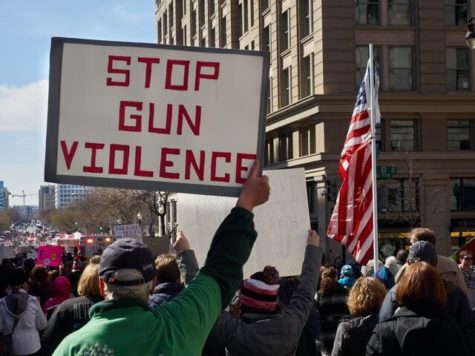Editorial: What to do with the Ames Police
The ISD Editorial Board encourages reform in the Ames Police for solidarity and unity throughout the Ames community.
July 8, 2020
Editor’s Note: An error was made concerning the percentage of funds designated toward law enforcement. Previously, the number was 30% instead of nine. The Daily regrets this egregious error.
As police brutality continues in the midst of protests in support of Black Lives Matter, one question crawls to the front stage in every city: are our police departments a part of the problem? And it happened nearly overnight after the death of George Floyd.
Since the murder of Floyd, 19 cities including Baltimore; Seattle; Portland, Oregon; Philadelphia; Hartford, Connecticut and counting have enacted defunding measures to their police departments as a response.
“‘Defund the police’ means something different to everyone, but the common theme involves cutting funding from police department budgets and, instead, investing in social programs to address underlying issues like mental health and addiction,” according to Axios.
While defunding is now a hot topic in the news, it is not a new topic in our system. The city of Camden, New Jersey, one of the most corrupt cities in America at one point, already defunded their police seven years ago, and it was transformational. “Data shows that over the past seven years, violent crimes have dropped 42 percent in the city, and the crime rate has dropped from 79 per 1,000 to 44 per 1,000.”
While defunding the police has only occurred in major cities thus far, more rural cities like Ames, Iowa, and Princeton, Iowa, also question the status of their police departments. However, because of obvious differences between urban and rural cities concerning population and function, we have to consider these differences in order to effectively make change in the police departments.
“‘Defunding the police’ isn’t a simple, blanket statement. It can mean different things depending on who you ask and what a particular community is advocating for,” also according to UpWorthy.
Defunding is situational and we can’t reform police departments in the same manner as cities in rural areas.
Rural areas already struggled with recruiting police officers due to population and need before the murder of George Floyd, especially with poor pay and perception contributing as factors. This was the case in Princeton, Iowa. Some police leaders have suggested local grassroots solutions with a mix of federally backed programs in rural areas to help solve the individualized issues within their communities.
Despite what is done, urban cities and rural communities will have to take different approaches in solving specific issues, not only due to these demographic differences but because of budget differences as well. If defunding is not the solution, then some reform will be necessary.
Police training is only about 13 to 19 weeks long, about a fraction of that in European countries. We need to offer police officers tools for problem solving that don’t involve just target practice. For example, adding social workers to their payrolls would be a beneficial tool for situations involving domestic abuse or child involvement. Recruiting practices can be reformed by presenting positive situations as a police officer instead of highly violent cases.
Our police forces across the country are highly militarized, which might not help disclose sentiments of safety. Yes, they are here to serve and protect, but that does not mean weaponizing is the best method. NPR briefly explains the growth of militarization of police in the U.S. here.
Even though we are debating defunding police departments across the nation, we have to consider what Black leaders want in respect to police brutality, as these communities are the primary targets of these abuses. Black leaders everywhere, even Iowa, are calling for the police to be defunded alongside the demand of stopping usage of chemical irritants and overuse of force.
But what about Ames?
While the Ames Police may not need reform (as they have impeccable relationships with their community and community members), the overall culture of police needs to change. This could mean adding a diverse set of civilians to form a review committee, which would oversee the police complaints and functional nature of the department.
In Ames, the percentage of the general budget that is granted toward public safety is nine percent, where the police department is only a fraction of that. How and if we should defund or reform the police departments in rural communities such as Ames needs to be examined at a much closer level, especially when it concerns examining the use of funds. If there is a push toward defunding and reform, then the process should occur slowly and gradually.
We love our police officers and police force, but there needs to be a type of reform in a positive direction so Iowa State University and its community as a whole can warmly welcome Black and Brown people from everywhere. It’s not that we are disappointed, we are actually quite happy with the police force in Ames. However, for there to be a massive change in a society, there needs to be contributions everywhere.

















